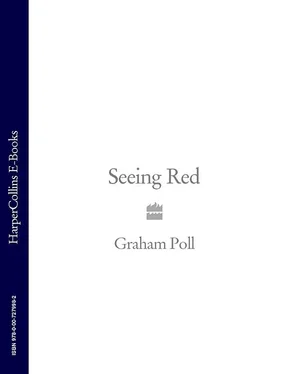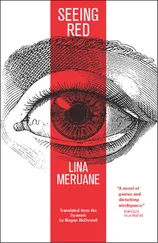A group of Spurs players, including Pascal Chimbonda, were confronting Terry and, as they did so, the Chelsea player began moving away from the penalty area. But he collided with Hossam Ghaly and I knew that, if I didn’t act quickly, there would be a really ugly scene. I called Terry over, showed him the yellow and then the red cards, and he left the field without a mutter of complaint. No other Chelsea players protested about their captain’s dismissal either – although they had complained about nearly every other decision throughout the game.
They found enough to moan about again when I ended the game a little later. As we walked off, Cole swore at me and had a go at my decision making.
I could have sent Cole off for that. I could have red-carded him for using insulting language, or shown him his second yellow for dissent, but I let it go. José Mourinho made a snide remark in the tunnel. Again, I did nothing about it. I was focused on reaching the changing-room.
Perhaps I should have done something about Cole or his manager, but I knew the punishments would be inconsequential. I knew too that referees cannot report every player and every manager who says something out of order – we’d get writer’s cramp.
So, if you had asked me at that moment whether I had handled the game well, my honest assessment would have been that I had been a bit lenient afterwards towards Chelsea. But I would also have said that it had been probably the best game of the season so far and that, yes, I had helped facilitate it. I had done my job.
Five minutes after I had reached the officials’ changing room, there was a knock on the door. It was John Terry and Gary Staker, Chelsea’s player liaison officer and administrative manager. Terry said, ‘I need to know why you sent me off.’ In theory, he was not meant to be in my room. Only managers were permitted to go to the referee’s room, and then only thirty minutes after the game. The idea is to give people a chance to calm down and to prevent the referee’s room being besieged. But I like to sort things out face-to-face and I had got on well enough with Terry for several years. So I said, ‘You had already been cautioned and then, in my view, you grabbed Ledley King and pulled him to the floor in an aggressive fashion. It wasn’t as if you just lent on him – you pulled him down.’
He said, ‘Oh. It wasn’t a straight red then.’
‘No, John,’ I confirmed. ‘It was a second yellow card.’
The fourth official, Peter Walton, who was also in the room, chipped in, ‘So it means you will only miss one game.’
‘Does it?’ said Terry.
‘Yes,’ said Walton. ‘It’ll be the Carling Cup tie against Aston Villa.’
‘Fine … that’s fine then,’ said Terry. He left, looking relieved.
I was not sure what that was all about. His initial inquiry – ‘I need to know why you sent me off’ – was a bit odd. The referee’s assessor, Gary Willard, and the match delegate, former West Ham midfielder Geoff Pike, were happy as well. Willard gave me a strong hint that he wanted me to report Chelsea for the incident when I had been surrounded by an angry group of players and both Willard and Pike made comments about Terry looking guilty, rather than surprised, when he was sent off.
I did not have an inkling that a firestorm of controversy was about to erupt. Out of the blue, Chelsea attacked me from three directions. First – and I probably should have seen this one coming – manager José Mourinho purported to be mystified by the disallowed Drogba ‘goal’ and by Terry’s sending-off. He told reporters, ‘I don’t understand why John Terry was sent off. I cannot find a reason for that. The team gave everything and played high-pressure football. We had chances with one player less. But Mr Poll goes home, and nobody can ask him about the reasons behind his decisions. I never ask referees about their decisions because they always have an excuse. So why should I ask him? He would say something like “Didier Drogba was free and had a clean header but somebody thirty metres away made a foul.” They always have an excuse for their decisions.’
There was some seriously flawed logic there. He seemed to think that I should have allowed Drogba’s ‘goal’ to stand because Terry’s foul was some distance away. That is self-evidently nonsense. On that basis, if someone thumps one of Mourinho’s men a long way from the ball, the referee should take no action.
But Ashley Cole, who provided the second prong of the attack on me, made the same daft mistake in his reasoning. He said, ‘Sure, JT got involved with someone on the edge of the box but it was nowhere near the ball.’ So what, Ashley? It was a foul. It occurred before Drogba headed the ball. It was not a goal – and it should not have been a controversy.
Cole made a much more damaging allegation about me, however. He said I had told Chelsea, ‘You need to be taught a lesson.’ He said that Frank Lampard had told him I had said that. Most newspapers took Cole’s word at face value. The implication was that I was deliberately harsh on Chelsea. Some reporters jumped to the conclusion that I was trying to inflict my own punishment on Chelsea for the way they had harangued Italian referee Stefano Farina in the midweek game against Barcelona.
There was only one problem with that theory. I had not said anything about teaching Chelsea a lesson.
I merely said the sort of thing I had said to players for twenty-six years. During the time when Chelsea were haranguing me about the Ballack booking, I said to Lampard, ‘Your team are losing their discipline. You need to get it sorted out or I will have to.’ There is a profound difference between what I said and how Cole reported Lampard’s version of what I said. I had urged Lampard to calm down his teammates. I had not implied some sort of vendetta on my part.
But the newspapers had their headlines. Some went with the angle that I had told the England captain to ‘F* * * off’. Some were more excited about my determination to teach Chelsea a lesson. Neither was true.
The third attack on me had not happened yet, but another blow did land and hurt. During the following week the FA told me they were not taking any action against Chelsea for surrounding me and haranguing me because I had not been intimidated. In other words, because I had been strong enough to deal with the incident without looking terrified, Chelsea were going to get away with it.
With that decision, the FA let down every referee in the country – especially the teenagers taking charge of parks matches. The FA signalled to every team in the land that it was perfectly acceptable for an angry mob to surround refs and scream in their faces.
The FA had let me down as well. That season, like never before, I needed their backing. I had made a big mistake at the World Cup and, if I was going to get back my credibility, the FA needed to stop players disputing every decision I made and undermining me by crowding around in a querulous gang.
I asked, in passing, whether Ashley Cole was going to be charged over what he had accused me of saying. The response from the FA astounded me. I was told, ‘We need to investigate the matter thoroughly before making a decision.’ So, instead of supporting me, the FA were investigating me. They thought I might actually have said that I wanted to teach Chelsea a lesson. I felt hugely let down.
Then came attack number three from Chelsea. It was launched by Terry himself in an interview with Chelsea’s own television channel that was gleefully picked up by all the newspapers. He said, ‘On the pitch Graham Poll said to me that it [the second yellow card] was for the barge on Hossam Ghaly where I just kept running. Then, after the game, he then said to me it was for the fall when me and Ledley King fell. So, you know, he’s obviously had a look at it or got people to look at it and decided that’s probably the best option for him as it covers every angle for him.’
Читать дальше












